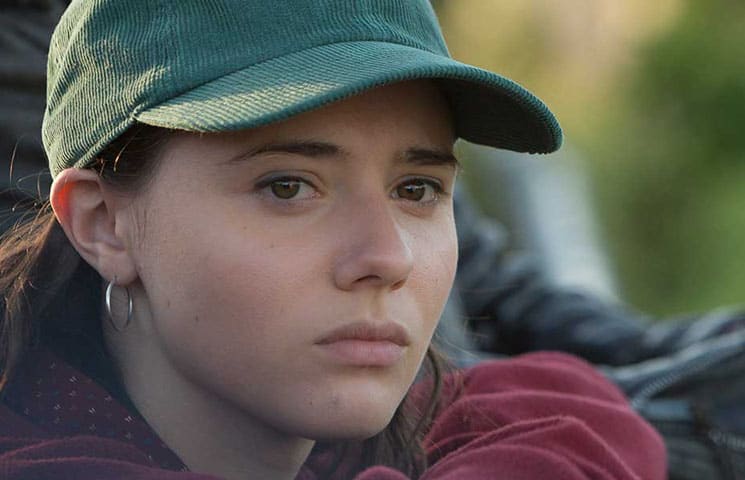When Léo (Karelle Tremblay), a quirky outsider with killer style and all the teenage angst in the world, skips out on dinner with her family, she does not exactly come across as likeable. Leaving the restaurant mid-meal without telling them, she hops on a passing bus and ends up at a diner with schoolmates.
The Fireflies Are Gone follows Léo through her final days of high school, as she feels trapped and restless in her rural Quebec hometown. Capturing how industrialization has a quiet, but constant impact, Léo feels especially frustrated as she misses her father, an ex-union leader forced to leave when the mill where he worked shut down. The obvious outlet for her anger is her stepdad, a conservative radio personality who played a role in pushing her father out.
When Léo strikes up a friendship with the 30-something metalhead Steve (Pierre-Luc Brillant), who lives in his mother's basement, the film seems at risk of falling into a predictable and painful trope of teenage girlhood. The one where the cool, alternative girl befriends a thoroughly mediocre older man, which builds to a pseudo-sexual, almost predatory relationship (think Ellen Page and Jason Bateman in Juno). Thankfully, while there are undeniable tensions in their relationship, writer and director Sébastien Pilote handles these tensions with care.
Seemingly constant pieces of Léo and Steve's lives change, and Pilote challenges the viewer to complicate their initial perceptions of the characters, and see them in a new light. As the film unfolds, it creates space to understand Léo as a frustrated, lonely young woman holding onto some deeply rooted anger. Léo, like all of the characters in The Fireflies Are Gone, gets to be both imperfect and deserving of empathy.
In one of their first meetings, Léo tells Steve that a bay can be an opening to the rest of the world, or it can be a dead end. Steve responds by asking if he's the dead end. Like his characters, full of their own contradictions, Pilote's writing resists singular interpretation. Instead, in thoughtful and nuanced turns, he breaks open a story of burgeoning adulthood and changing small-town Quebec with style and care.
(Séville International)The Fireflies Are Gone follows Léo through her final days of high school, as she feels trapped and restless in her rural Quebec hometown. Capturing how industrialization has a quiet, but constant impact, Léo feels especially frustrated as she misses her father, an ex-union leader forced to leave when the mill where he worked shut down. The obvious outlet for her anger is her stepdad, a conservative radio personality who played a role in pushing her father out.
When Léo strikes up a friendship with the 30-something metalhead Steve (Pierre-Luc Brillant), who lives in his mother's basement, the film seems at risk of falling into a predictable and painful trope of teenage girlhood. The one where the cool, alternative girl befriends a thoroughly mediocre older man, which builds to a pseudo-sexual, almost predatory relationship (think Ellen Page and Jason Bateman in Juno). Thankfully, while there are undeniable tensions in their relationship, writer and director Sébastien Pilote handles these tensions with care.
Seemingly constant pieces of Léo and Steve's lives change, and Pilote challenges the viewer to complicate their initial perceptions of the characters, and see them in a new light. As the film unfolds, it creates space to understand Léo as a frustrated, lonely young woman holding onto some deeply rooted anger. Léo, like all of the characters in The Fireflies Are Gone, gets to be both imperfect and deserving of empathy.
In one of their first meetings, Léo tells Steve that a bay can be an opening to the rest of the world, or it can be a dead end. Steve responds by asking if he's the dead end. Like his characters, full of their own contradictions, Pilote's writing resists singular interpretation. Instead, in thoughtful and nuanced turns, he breaks open a story of burgeoning adulthood and changing small-town Quebec with style and care.




